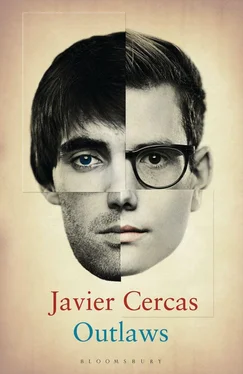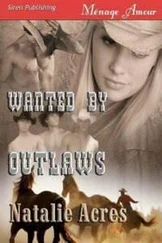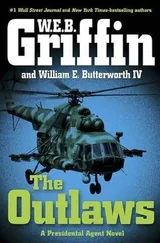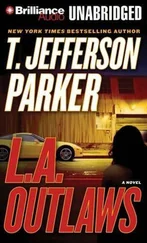‘A little while later a slightly older guy came over to sit with us. He was wearing cowboy boots, very tight flared jeans and his shirt unbuttoned; a gold chain shone on his chest. The guy sat astride a chair, beside Zarco, leaned his forearms on the chairback and pointed at me: And this posh kid? Everybody shut up; I suddenly noticed eight pairs of eyes staring at me. Zarco broke the silence. Fuck, Guille! he admonished. He’s the guy from Vilaró: I told you he’d show up eventually. Guille made a face like he didn’t know what Zarco was talking about. Zarco was about to go on when the landlady appeared with more beers and with a kid they called Drácula. When the landlady left (and Drácula stayed: they called him that because one of his eye teeth stuck out over his lip), Zarco continued: Go on, Gafitas, tell Guille what you told me the other day. Although I guessed what he meant, I asked him what he meant. What you told me about the arcade, he said. I told him; flattered by my momentary prominence, maybe trying to score points in front of the group (or just in front of Tere), I added that now I was helping Señor Tomàs close the place. Zarco asked me a couple of questions, among them how much money Señor Tomàs collected each day. I don’t know, I said, honestly. More or less, Zarco insisted. I said a figure that was too high, and Zarco looked at Guille and I looked at Tere and at that moment I guessed I shouldn’t have said what I’d just said.
‘I soon forgot my hunch, and spent the rest of the afternoon with them. After my starring moment on account of the arcade and Señor Tomàs, I barely opened my mouth again; all I did was try to go unnoticed and listen while they drank beer at La Font and went out to smoke joints sitting on the rail of the bridge over Galligants, in the Sant Pere Plaza. That was how I found out three things: the first is that Zarco and Tere lived in the prefabs (as I later learned, the rest of them lived in Pont Major, Vilarroja and Germans Sàbat, but all of them or almost all of them had lived in the prefabs and most of them knew each other from there); the second is that, apart from Zarco, who was from Barcelona and had only been living in Gerona for a few months, they were all from Gerona or had been living here for years; and the third is that Zarco, Guille, Gordo and Drácula had all spent time in reform school (as I later learned, between the previous summer and the winter of that very year Zarco had been in Barcelona’s Modelo Prison, even though he hadn’t yet turned sixteen and was still a minor). As for the rest of it, until that day I had never tried hashish, so towards evening, after the feeling of well-being and uncontrollable laughter that a couple of tokes provoked had passed, I started to feel bad and, while we were on our way back to La Font from Sant Pere Plaza, I slipped away from the group and walked down Bellaire Street away from the district.
‘Walking through La Devesa did me good. When I arrived at the arcade it was still open, and as I walked past Señor Tomàs’ booth I waved to him, but didn’t stop to talk. I went directly to the washrooms; I looked at myself in the mirror: I was pale and my eyes were red. I still felt like I was floating in a thick fog; to clear my head I urinated, took off my glasses, washed my face and hands. Then, as I looked back at myself in the mirror again, I remembered Zarco and Guille’s conversation about Señor Tomàs and the arcade. On my way out of the washroom I bumped straight into the old man; as if he’d caught me doing something wrong, I was startled. What’s wrong? asked Señor Tomàs. Have you been sick again? I said no. Well, you still look ill, son, said Señor Tomàs. You should go to the doctor. We’d started to walk towards his booth. The arcade was still full of people, but Señor Tomàs announced: We’ll close in ten minutes. At that moment I thought I should tell him what I’d told Zarco and Guille and the rest of them at La Font, and what I was starting to suspect about them; only then did I realize that maybe he had suspected it much earlier than me, since the first afternoon Zarco and Tere showed up at the arcade, and that this was precisely why he’d offered to make me his helper. Even so, I didn’t dare confess my suspicions — after all, doing so would have also meant confessing that I’d been with Zarco and the others and in a sense had turned into their accomplice, or at least that I’d said too much — and ten minutes later I helped him close up.
‘That same night I had my first fight with my father. I mean the first more or less serious fight, of course, because we’d already had quite a few unimportant fights; not many, really: up till then I’d behaved like a good boy, and the one who had fights in my house was my sister, who was the eldest (and who, therefore, because I was a good kid and never confronted my parents, accused me of being a coward, a hypocrite, faint-hearted and accommodating). But over the last little while things had begun to change and the run-ins between my parents and me — mostly between my father and me — had become habitual; I suppose it was logical: after all I was a teenager; I suppose as well that, since nothing is as satisfactory as being able to blame someone else for all our woes, part of me blamed my parents for my troubles, or at least all the trouble Batista was giving me, as if I’d arrived at the conclusion that the inevitable result of my meek charnego upbringing was the horror in which Batista had me imprisoned, or as if this horror were part of the natural logic of things and Batista was just doing to me what, without my knowing or anyone having told me, his father had always done to my father.
‘I don’t know. The thing is that for months a wordless grudge against my parents had been growing in my guts, a silent fury that surfaced then, the first day I drank a few beers and smoked joints with Zarco’s gang. I have a sort of hazy memory of what happened that night, maybe because during that summer there were various similar episodes and in my memory they all tend to blend into a single one: one of those interchangeable quarrels between fathers and sons in which everyone says brutal things and everyone’s right. What I do remember is that when I got home it was after nine and my parents and my sister were having dinner. You’re home late, said my father. I mumbled an apology and sat down at the table; my mother served my dinner and sat down again. They were eating with the television news on, though the volume was so low that it barely interfered with conversation. I began to eat without lifting my eyes from my plate, except to look at the television screen every once in a while. My sister was absorbing my parents’ attention: she’d just finished high school at the Vicens Vives Institute and, while preparing to start university the following year, she had a summer job in a pharmaceutical lab. When my sister stopped talking (or maybe just paused), my father turned to me and asked how I was; avoiding his gaze, I said I was fine. Then he asked me where I’d been and I said outside. Oh oh oh, my sister intervened, as if she couldn’t stand not being the centre of attention for every second of the meal. But look at the eyes on you! What’ve you been smoking? A hush fell over the dining room, disturbed only by the sound of the television, where there was news of an attack by ETA. Shut up, you idiot, I said before I could stop myself. There’s no need to insult anybody, said my mother. Besides, your sister’s right, she added, putting her hand on my forehead. Your eyes are red. Are you feeling all right? Pulling my forehead away I said yes and kept eating.
‘Out of the corner of my eye I saw my sister observing me with her eyebrows arched mockingly; before she or my mother could add anything, my father asked: Who were you with? I didn’t answer. He insisted: Have you been drinking? Have you been smoking? I thought: What’s it to you? But I didn’t say it, and I suddenly felt a great serenity, a great self-confidence, just as if all the confusion of the beers and the joints had cleared in one second and had left only a lucid form of rapture. What is this? I asked without getting upset. An interrogation? My father’s expression hardened. Is something going on with you? he asked. Let it go, Andrés, my mother chimed in, trying again to restore the peace. Keep quiet, please, my father cut her off. Now I was staring back at him; my father insisted. I asked you what’s going on. Nothing, I answered. Then why don’t you answer me? he asked. Because I don’t have anything to say, I replied. My father kept quiet and turned towards my mother, who half-closed her eyes and begged him in silence to let it go; my sister was watching the scene with barely disguised satisfaction. Look, Ignacio, said my father. I don’t know what’s going on with you lately, but I don’t like you behaving the way you’ve been behaving: if you’re going to keep living in this house. . And I don’t like to be lectured, I interrupted; then I continued, fired-up: When did you start drinking? When did you start smoking? At the age of fourteen? Fifteen? I’m sixteen, so leave me alone. My father didn’t interrupt me; but, when I finished speaking, he left his cutlery on his plate and said without raising his voice: The next time you speak to me like that, I’ll knock your teeth out. It felt like a blow to the chest and throat, I looked at my almost empty plate and then at the TV: on the screen, the Minister of the Interior — a man with square-framed glasses and a severe countenance — was condemning the terrorist attack on behalf of the government. As I stood up from the table I murmured: Fuck right off.
Читать дальше












